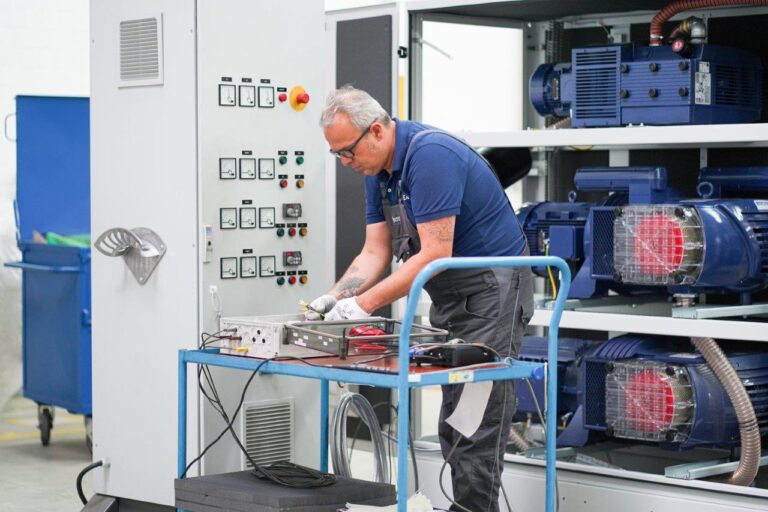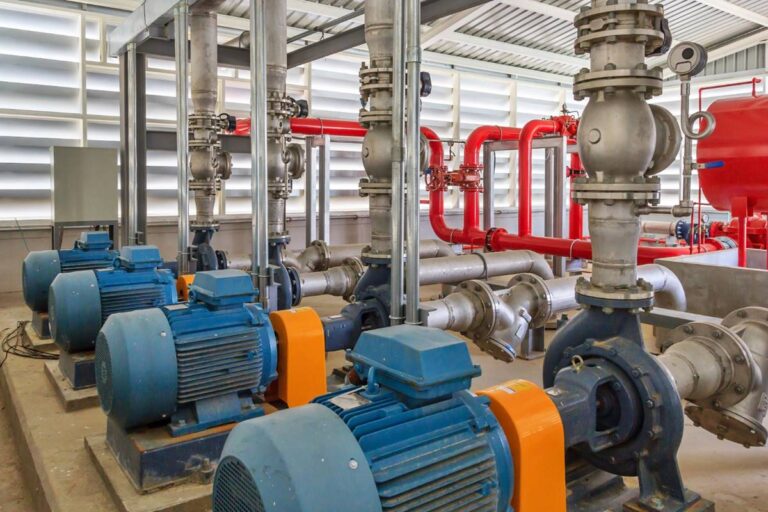Vacuum pumps are used in a huge array of manufacturing processes as creating a vacuum has uses in packaging, bottling, drying, degassing, pick and place to name just a few. Industrial vacuum pumps are used in the processes to speed up, improve and maintain these types of processes. As a result, there are many types of vacuum pump technologies specific to certain processes or tasks.
Having the right pump for your application is crucial, not only for performance but for cost-effectiveness and reliability. It’s important to understand the features of each pump to know whether it’s suited to your purposes.
Vacuum Pump Operating Principles
All vacuum pumps operate on the same basic principle no matter the technology type. Vacuum pumps remove gasses and air molecules from a chamber. As pressure is reduced, reducing more molecules becomes more difficult. It is therefore important to know what vacuum levels you need to achieve for your application and the speed at which you need to get there.
Most common industrial applications operate in the low to medium vacuum range of 1000 mbar to 2 mbar absolute.
Scientific and specialised applications operate at levels below 1 mbar and require specialised vacuum pumps.
Categories of Industrial Vacuum Pumps
There is a wide array of pumps used in the medium to low vacuum range and having an understanding or their differences can help you to select the best type for your needs. Let’s look at the main types you are likely to encounter in the positive displacement pump range.
Rotary Vane Oil Free Pumps
These pumps as the name suggest are totally free of oil and utilise carbon vanes that drop in and out of the rotor slots as it rotates. They will typically reach an absolute vacuum level of up to 150mbar and are popular in applications where oil mist is a concern and the higher vacuum of an oil sealed pump is not required. They come in a large range of flow rates from as little as 2m3/h and exceeding 500m3/h. Used extensively in holding, packaging, lifting, conveying and printing applications they are a popular pump type.
Rotary Vane Oil Lubricated Pumps
Due to oil providing a greater seal than dry vane pumps these pumps typically reach up to 1mbar absolute in vacuum, so are a great alternative when your application demands these higher vacuum levels. Available in flow rates from 2m3/h to in excess of 600m3/h. Typical applications that require this level of vacuum are degassing, distillation, evaporation and some packaging. You will often still see them on applications that do not require the level of vacuum that they are capable of as some people simply like to have more capacity than they require.
Claw Pumps
These pumps are a dry running pump (free of oil or grease in the pump chamber) and have two claw shaped rotors that rotate contact free. They typically have an ultimate vacuum of 50 to 150mbar. One of their main attributes are their low maintenance nature as they have no vanes, oil or oil separators to replace. Utilised in the same applications as rotary vane pumps. Not generally seen in small flow applications as pump sizes mostly start from 100m3/h and going through to in excess of 500m3/h.
Side Channel Blowers
Side Channel blowers can be run as a vacuum pump or as a pressure pump. Unlike the previous types of pumps mentioned they operate on lower vacuum levels and higher flow rates. Typically having an ultimate vacuum of between 800mbar and 400mbar absolute. These pumps are almost maintenance free and quiet running. Used extensively in water aeration, conveying, gas scavenging, dental suction and holding applications. They cover a wide flow rate of less than 100m3/h to in excess of 1200m3/h
All of these pump types need to be protected from liquids and moisture entering as they are susceptible to corrosion. If your application involves liquids, there are measures you can take to or there are other pump types more suitable such as liquid ring pumps.
Conclusion
Using the right pumps for the right situation is crucial, and Becker’s modern designs mean efficiency can be improved compared to older designs. Becker Pumps offer tremendous benefits over other vacuum pumps when implemented correctly in the right situation.



